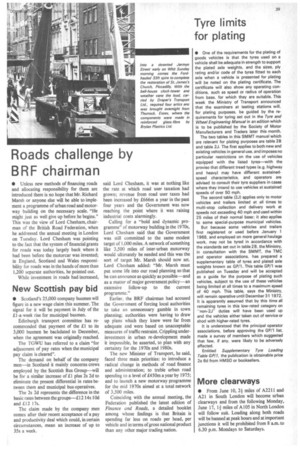Roads challenge by BRF chairman
Page 41

If you've noticed an error in this article please click here to report it so we can fix it.
• Unless new methods of financing roads and allocating responsibility for them are introduced there is no hope that Mr. Richard Marsh or anyone else will be able to implement a programme of urban road and motorway building on the necessary scale. "He might just as well give up before he begins." This was the view of Lord Chesham, chairman of the British Road Federation, when he addressed the annual meeting in London on Tuesday. Lord Chesham was pointing to the fact that the system of financial grants for roads was today largely back where it had been before the motorcar was invented; in England, Scotland and Wales responsibility for roads was in the hands of more than 1,200 separate authorities, he pointed out.
While investment in roads had increased, said Lord Chesham, it was at nothing like the rate at which road user taxation had grown; revenue from road user taxes had been increased by £666m a year in the past four years and the Government was now reaching the point where it was raising industrial costs alarmingly.
Calling for a "bold and dynamic programme" of motorway building in the 1970s, Lord Chesham said that the Government was still committed to the same modest target of 1,000 miles. A network of something like 3,500 miles of inter-urban motorway would ultimately be needed and this was the sort of target Mr. Marsh should now set. Lord Chesham added: "Mr. Marsh must put some life into our road planning so that he can announce as quickly as possible—and as a matter of major government policy—an extensive follow-up to the current programme."
Earlier. the BRF chairman had accused the Government of forcing local authorities to take an unnecessary gamble in town planning; authorities were having to draw up plans which they knew were far from adequate and were based on unacceptable measures of traffic restraint. Crippling underinvestment in urban re-development made it impossible, he asserted, to plan with any certainty for the 1970s and 1980s.
The new Minister of Transport, he said, faced three main priorities: to introduce a radical change in methods of road finance and administration; to treble urban road spending to a level of £450m a year by 1975; and to launch a new motorway programme for the mid 1970s aimed at a total network of 3,500 miles.
Coinciding with the annual meeting, the Federation published the latest edition of Finance and Roads, a detailed booklet among whose findings is that Britain is spending far less on roads per head, per vehicle and in terms of gross national product than any other major trading nation.
















































































































































